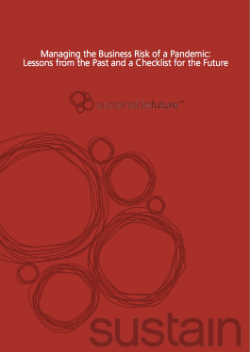The Observer recently interviewed Peter Piot about Ebola, and it is well worth a read. What is clear is that New Zealand, like all developed countries, must provide logistical support to West Africa.
As a young Belgian scientist, Peter was part of the team that discovered Ebola in 1976. In this article from 4 October 2014, he explains why he is doing everything he can to convince the powerful in this world to finally send sufficient help to West Africa: ‘This isn’t just an epidemic any more. This is a humanitarian catastrophe. We don’t just need care personnel, but also logistics experts, trucks, jeeps and foodstuffs. Such an epidemic can destabilise entire regions. I can only hope that we will be able to get it under control. I really never thought that it could get this bad.’
We also need to be prepared for an outbreak of the disease in New Zealand. In June 2006 the Institute published a report on Managing the Business Risk of a Pandemic: Lessons from the Past and a Checklist for the Future (see our publications page). Over the weekend I reread the report. Although it was written with a flu pandemic in mind, it still raises a number of questions and highlights lessons learnt that remain relevant today. Preparation and communication will be key, and this means changes to border control and the publication of a well-considered medical response plan are crucial. Epidemics have far wider impacts than simply health effects. It is time for businesses and communities to think hard about their responsibilities in regard to the movement of food, medicine, services and staff. It is difficult to see how Ebola will disappear in the next few months, so New Zealand must be ready. We must also be generous to those in need.
The Ministry of Health website states that Director of Public Health Dr Darren Hunt and Professor John Crump believe there is an ‘extremely low risk’ of Ebola arriving and spreading in New Zealand. It is hard to see on the MoH website how such a risk assessment is generated, however, risk is always assessed in terms of probability and magnitude.
I would imagine that without a vaccine in the next 12 months, the probability of Ebola arriving in New Zealand must be higher than ‘extremely low’ – perhaps more in the vicinity of 25% (this very rough calculation based on the fact that two countries [US and Spain] have had a human-to-human transfer outside of Africa in the last two weeks [52 weeks in a year divided by 2 weeks = 26 x 2 countries outside of Africa indicates that about 52 countries are likely to have an Ebola patient in the next 12 months if a vaccine is not found]). There are many other drivers that would impact on the risk to New Zealand but it is not, in my view, an ‘extremely low risk’ given what we have seen over the last two weeks.
New Zealand needs to be well prepared for this eventuality so I expect we will see the ‘extremely low risk’ status being moved upwards in the near future. By doing so, it will help to inform and prepare the medical community and the general public for such an event. To keep it as extremely low is inviting trouble; Ebola is not to be taken lightly – as recent events in West Africa indicate. We must be proactive and diligent to protect the people at the front line. The Institute will be doing more work on the risks of Ebola for New Zealand.

